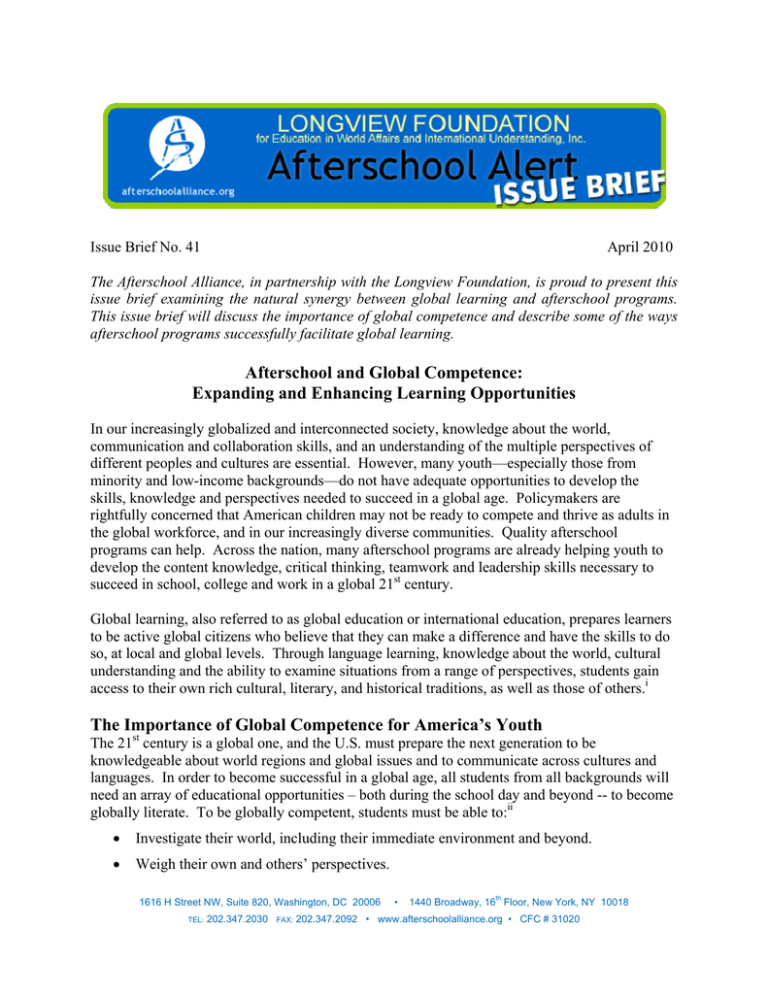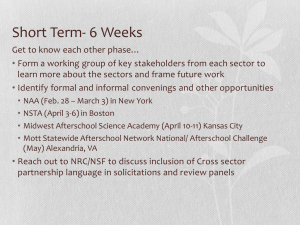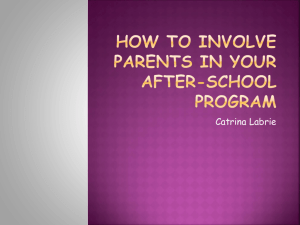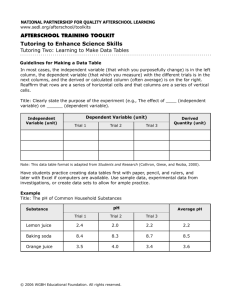PDF - Afterschool Alliance
advertisement

Issue Brief No. 41 April 2010 The Afterschool Alliance, in partnership with the Longview Foundation, is proud to present this issue brief examining the natural synergy between global learning and afterschool programs. This issue brief will discuss the importance of global competence and describe some of the ways afterschool programs successfully facilitate global learning. Afterschool and Global Competence: Expanding and Enhancing Learning Opportunities In our increasingly globalized and interconnected society, knowledge about the world, communication and collaboration skills, and an understanding of the multiple perspectives of different peoples and cultures are essential. However, many youth—especially those from minority and low-income backgrounds—do not have adequate opportunities to develop the skills, knowledge and perspectives needed to succeed in a global age. Policymakers are rightfully concerned that American children may not be ready to compete and thrive as adults in the global workforce, and in our increasingly diverse communities. Quality afterschool programs can help. Across the nation, many afterschool programs are already helping youth to develop the content knowledge, critical thinking, teamwork and leadership skills necessary to succeed in school, college and work in a global 21st century. Global learning, also referred to as global education or international education, prepares learners to be active global citizens who believe that they can make a difference and have the skills to do so, at local and global levels. Through language learning, knowledge about the world, cultural understanding and the ability to examine situations from a range of perspectives, students gain access to their own rich cultural, literary, and historical traditions, as well as those of others.i The Importance of Global Competence for America’s Youth The 21st century is a global one, and the U.S. must prepare the next generation to be knowledgeable about world regions and global issues and to communicate across cultures and languages. In order to become successful in a global age, all students from all backgrounds will need an array of educational opportunities – both during the school day and beyond -- to become globally literate. To be globally competent, students must be able to:ii Investigate their world, including their immediate environment and beyond. Weigh their own and others’ perspectives. 1616 H Street NW, Suite 820, Washington, DC 20006 TEL: 202.347.2030 FAX: • th 1440 Broadway, 16 Floor, New York, NY 10018 202.347.2092 • www.afterschoolalliance.org • CFC # 31020 2 Communicate and collaborate with diverse audiences. Translate their ideas and findings into appropriate actions to improve conditions. For the past decade, our educational system has focused on closing achievement gaps between the lowest and highest performing students, and emphasizing core subjects such as reading and math. However, U.S. students are faring poorly compared to their international counterparts on international assessments, such as the Programme for International Student Assessment (PISA), which measures necessary 21st century skills like critical thinking and problem solving. These results are significant – countries that do well on PISA demonstrate higher increases in GDP growth.iii Studies show that cognitive skills are significantly more important in determining economic outcomes than the traditional measure of educational success: school attainment. In other words, the amount of time someone spends in school is not as important as what happens during that time, and what is learned during that time must be broader than the current focus on minimum competencies in reading, math and science.iv The economies of China, India and Japan are expected to represent 50 percent of the world’s GDP within 30 years.v Currently, one in five U.S. jobs is tied to international trade, a proportion that will continue to increase.vi As a result, once in the workforce, today’s youth will most likely engage in commerce with other countries, management of employees from other cultures and countries, collaboration with colleagues from around the -Delia Pompa, Vice President for Education, world and tackling global problems such as hunger, climate National Council of La Raza change and disaster recovery.vii To continue to expand our country’s economic growth, it will be necessary to graduate future employees who can take more local companies global – to reach new markets and new customers, and create new solutions with new partners. When we look at developing globally minded kids, we need to open up their vision of what is around them and what is far away. It’s not just about learning about cultures or languages. It’s about developing a new world view. Digital literacy and learning also play a strong role in how we approach global competence. Globalization, global job competition, and the digital world in which students are socialized make it imperative for educators to incorporate educational uses of technology into the conventional aims and means of education for all students. Evidence indicates that there is a significant lag between education in the public schools and the digital technology and culture in which students today are deeply involved.viii Integration of educational technology can help bridge the gap while at the same time bringing the world to students and students to the world – especially those who do not have opportunities to travel abroad. Unique Opportunities for Global Learning After School Successful afterschool programs develop and promote strong relationships among youth, schools, families, and community institutions. Informal learning programs, including afterschool, before-school and summer programs in schools, community-based and faith- based organizations and cultural institutions provide excellent platforms for students to experience new things and look at learning and communities in new ways. Further, youth who participate in 1616 H Street NW, Suite 820, Washington, DC 20006 TEL: 202.347.2030 FAX: • th 1440 Broadway, 16 Floor, New York, NY 10018 202.347.2092 • www.afterschoolalliance.org • CFC # 31020 3 afterschool programs maintain better grades, have lower rates of truancy, are more engaged in school and attain higher levels of achievement in college.ix Afterschool programs are a powerful resource for global literacy and as such can:x Expose young people to in-depth content about global issues as well as cultures, countries and languages. I began attending Friday Provide youth with opportunities to learn and use digital Leadership eight years ago media and technology in order to conduct research and and my worldview communicate effectively on global topics. changed dramatically. The more I learned, the more I Enable social and emotional development critical to crosswanted to know. Global cultural understanding, communication, and collaboration. Kids changed my life. I not Develop leadership and civic participation by empowering only felt hopeful about the youth to take action on issues of both local and global future of the world, but I relevance. felt empowered to make change. Engage youth in learning about international opportunities -Global Kids Alum in college and future careers. Ideally, afterschool programs work with educators and youth workers to develop a safe, inspiring and exciting space for global learning. Afterschool programs can harness the diversity of the community and existing cultural and heritage institutions to build community partnerships that reflect the demographics of the students. These partnerships provide students with a rich experience and make relevant local connections to the global issues that youth are exploring. Below are examples of afterschool programs that are successfully integrating global learning into their programming.xi At Global Kids, we were exposed to the world, to global issues. It exposed me to the realm of human suffering and trying to do something about it. And that's what I want to do with my life. As I grow older, advance in my career and accomplish all the things I aspire to accomplish, I always attribute it to my years as a Global Kid. Global Kids is a New York City based nonprofit committed to educating and inspiring urban youth to become global and community leaders – creative thinkers, problem solvers, and contributing citizens prepared for academic and workplace success. Through leadership development, academic enrichment and digital media programs, Global Kids works with high school students after school and online to build digital literacy, foster substantive virtual dialogues about current events and promote civic participation. After School Leadership sessions are fun and interactive and are developed based upon students' interests and concerns. They include role-plays, games, research with diverse media sources, small and large group dialogues, field trips, and forums with guest speakers. These activities develop skills and confidence, college and career readiness, -Global Kids Alum 1616 H Street NW, Suite 820, Washington, DC 20006 TEL: 202.347.2030 FAX: • th 1440 Broadway, 16 Floor, New York, NY 10018 202.347.2092 • www.afterschoolalliance.org • CFC # 31020 4 respect for diversity, and knowledge of such issues as human rights, globalization, international and intra-national conflict, peace-building, and global health. As a result, participants gain a rich understanding of the links between their own experiences and the complex global issues that are shaping their lives. Power of Citizenry participants receive sophisticated training in workshop facilitation and peer education. Through a range of activities they organize, such as conferences in their schools, workshops, public awareness campaigns, and media projects, the youth educate their peers about international events, the importance of civic engagement, the value of diversity, and a host of other values. Youth are also provided with opportunities to participate in special activities, field trips and programs at the Council on Foreign Relations, the Online Leadership Program or the Human Rights Activist Project. Latona School Associates (LSA) is a before-school and afterschool program based at the John Stanford International School (JSIS), an elementary school in Seattle, Washington, and serves 100 families. Latona School Associates provides high-quality programming while augmenting the school curriculum with international and multi-cultural projects that are delivered by multilingual staff. Students of LSA are divided into four classrooms based on their age and developmental and social needs. Each classroom offers a variety of activities aligned with the JSIS curriculum, including homework Through my participation in support, arts and crafts, cooking, drama, interest clubs, [the] Global Youth Media and cooperative and competitive games, and fieldtrips and Arts Program, I have been other enrichment activities. able to incorporate international issues in art In every planning session, LSA staff review the school teaching, strengthening both curriculum and develop programming that will disciplines...I have really seen complement school learning while engaging the youth. students' interest in For example, if children are studying Australian ecocommunity and global affairs system in school, then the afterschool program may focus rise and this innovative on aboriginal culture and the arts of Australia. Other approach of using media and curriculum activities include: arts to engage youth has o Breakfast around the world – Each classroom proven very successful... explores what different cultures eat for breakfast - Sharon Taylor, Teacher at Middle as a way to reinforce awareness of nutrition and College High School, NY science skills. o Disease and transmission – Children look at the universal language of math and apply it to science to see how diseases happen throughout the world the same way. o Central figures of myth – Classrooms study myths that have central figures which are repeated across many cultures, such as the five different renditions of the Cinderella fable, to practice reading skills. Children create their own myths to practice writing. o Environmental conservation and stewardship - Each classroom has their own identity that is related to an endangered animal, such as sea turtles, pandas, etc. This allows 1616 H Street NW, Suite 820, Washington, DC 20006 TEL: 202.347.2030 FAX: • th 1440 Broadway, 16 Floor, New York, NY 10018 202.347.2092 • www.afterschoolalliance.org • CFC # 31020 5 each class to study life cycles and ecosystems through one in-depth example from another part of the world. World Savvy's Global Youth Media and Arts Program (MAP) is an interdisciplinary global arts and media education program serving middle and high school students in New York, San Francisco and Minneapolis. Students develop content knowledge of the program themes--for example, immigration and identity--while honing their skills for global citizenship, including critical thinking, multiple perspectives, and appreciation of diversity locally and globally. The program helps students explore how global issues are related to their own experiences. World Savvy aims to not only serve youth, but also empower and enable schools and afterschool programs to provide global learning. Global literacy programming includes: o Creative customized workshops that focus on the global theme. o Fieldtrips to local arts institutions and communities. o A Saturday jam session for all participating youth to create and learn with adult artists and media professionals. o The Global Youth Media and Arts Festival - a professional public exhibition and performance showcase for all participating youth. Each World Savvy site takes an interdisciplinary approach, with educators helping youth lead project development around their interests. For example, youth in the World Savvy MAP program at a Bronx, New York high school decided to explore their local community and identified community center that helps support new immigrant families. The students went to the center and interviewed the staff working with immigrant children, then decided to use their arts skills to design T-shirts and other items for fundraising. In the process, they shared their knowledge of design and printmaking through a workshop with the immigrant students. At the end of the project, they exhibited the T-shirts in the World Savvy city-wide exhibition and sold them to raise funds for the community center. OneWorld Now http://www.oneworldnow.org/home.html OneWorld Now in Seattle, Washington, offers opportunities for young people to increase their tolerance, gain new language and leadership skills and to experience other cultures firsthand. Their mission is to ensure that every high school student has access to transformational learning experiences, including world language studies, leadership training and study abroad opportunities. They provide international learning experiences to underserved youth through world language studies, leadership training, study abroad scholarships and college and career opportunities. OneWorld Now also offers afterschool programs a model on how to comprehensively teach youth about different languages and cultures. In addition to their work with Seattle youth, OneWorld Now! holds an annual Get Global Conference designed to give students, educators, and non-profit innovators from around the country the opportunity to discuss and take action regarding the role of youth leadership in international affairs. http://oneworld-now.org/getglobal.htm 1616 H Street NW, Suite 820, Washington, DC 20006 TEL: 202.347.2030 FAX: • th 1440 Broadway, 16 Floor, New York, NY 10018 202.347.2092 • www.afterschoolalliance.org • CFC # 31020 6 Resources for Global Learning Many organizations recognize the importance of global competence and the critical role that afterschool programs play in ensuring that youth have access to the engaging activities that global learning curricula can provide. Below is a list of organizations and resources that afterschool programs can access to help them implement global learning. Asia Society’s Partnership for Global Learning http://www.asiasociety.org/education-learning Asia Society is the leading global organization working to strengthen relationships and promote understanding among the people, leaders, and institutions of Asia and the United States. To fulfill and extend this educational mission, the Asia Society Partnership for Global Learning supports teaching and learning about the world in the U.S. education system. Asia Society’s goal is to develop youth to be globally competent citizens, workers, and leaders by equipping them with the knowledge and skills needed for success in an interconnected world. o Expanding Horizons is a guidebook that offers strategies and resources for the afterschool field on how to integrate global learning into its programs, and help our next generation become globally competent:http://www.asiasociety.org/educationlearning/afterschool/expanding-horizons-how-globalize-afterschool o Through regular website articles, Asia Society also provides valuable insight into how programs can connect their curriculum and approaches to learning to global content: http://www.asiasociety.org/education-learning/afterschool/connecting-global-contentcurriculum-and-approaches o Asia Society’s Partnership for Global Learning – a national network committed to sharing best practices, promoting policy innovations, and creating connections for successful global futures – provides a monthly e-newsletter, professional development events, and an annual conference:www.asiasociety.org/pgl National Summer Learning Association http://www.summerlearning.org/?page=about_us The National Summer Learning Association serves as a network hub for thousands of summer learning program providers and stakeholders across the country, providing tools, resources, and expertise to improve program quality, generate support, and increase youth access and participation. They also offer publications and resources on global learning for out-of-school time programs, including the All Over the World curriculum. Find some of their available resources here: http://www.summerlearning.org/?page=allovertheworld. Foundations, Inc. http://www.afterschooled.org/ The Center for Afterschool Education at Foundations, Inc. provides professional development, technical assistance, tools and publications tailored to afterschool programs and offer publications on cultural competence, English language learning, and global learning, such as Global GraffitiWall. Find available publications here: http://www.foundationsinc.org/online-store/products/364. 1616 H Street NW, Suite 820, Washington, DC 20006 TEL: 202.347.2030 FAX: • th 1440 Broadway, 16 Floor, New York, NY 10018 202.347.2092 • www.afterschoolalliance.org • CFC # 31020 7 iEARN http://media.iearn.org/home The iEARN Collaboration Centre enables youth to learn with, rather than simply about, the world. Students can join discussion forums with other students from around the world, work on virtual “projects” and participate in summits. iEARN offers resources and project ideas for students and educators, and opportunities to connect with youth from around the world. You can join a current iEARN project with other students all over the world here: https://media.iearn.org/projects. National Geographic http://kids.nationalgeographic.com/ This interactive website offers fun games and activities that teach youth about geography, art and nature from around the world. Also offered are publications and resources for educators and afterschool providers. Global SchoolNet.org http://www.globalschoolnet.org/ Global SchoolNet supports global learning and academic performance through online collaborative projects linking students from around the world. They engage teachers and K12 students in meaningful project learning exchanges worldwide to develop science, math, literacy and communication skills, foster teamwork, civic responsibility and collaboration, encourage workforce preparedness and create multi-cultural understanding. Global SchoolNet has developed a database of global learning programs to help educators and youth workers find global partners or projects to take part in: http://www.globalschoolnet.org/index.cfm?section=Collaborate. They also provide ideas on how to use various tools, from blogs to interactive maps, for global learning projects: http://www.globalschoolnet.org/gsncenter/ . Outreach World http://www.outreachworld.org/aboutus.asp The Outreach World website features 120 federally-funded National Resource Centers, Language Resource Centers and Centers for International Business and Education Research, all aimed at elementary, middle, and high school students. Outreach World offers resources that afterschool programs can use to enrich and build their global learning curricula. Educators at sites across the world can collaborate and share lesson plans and curricula on global learning via their website at: http://www.outreachworld.org/searchresources.asp. Much of the curricula listed on the website resource page, such as a lesson plan on Turkish culture and a discussion session that brought together visitors from Russia, Uzbekistan, and America, were used in the afterschool hours. Local Resources and Partners for Global Learning There are many local resources that can help afterschool programs interested in integrating global learning into their activities, from universities to community cultural organizations. Many of these organizations are committed to expanding global learning, or have made it a priority. 1616 H Street NW, Suite 820, Washington, DC 20006 TEL: 202.347.2030 FAX: • th 1440 Broadway, 16 Floor, New York, NY 10018 202.347.2092 • www.afterschoolalliance.org • CFC # 31020 8 Some examples of groups that can help include: Local chapters of the World Affairs Council. The Council is committed to supporting international education for students and teachers, and sponsors a variety of programs during the academic year and summer. https://www.worldaffairsdc.org/education.php Children’s museums Chambers of Commerce Rotary Clubs Universities - language and international studies departments Internationally focused foundations Local chapters of the Model United Nations State Departments of Education Arts Board Local arts & cultural organization State chapter of language teacher associations State chapter of Council for the Social Studies Conclusion Afterschool programs are providing global learning opportunities to youth while helping them gain the global competencies that are critical their success in college and beyond. As the skills needed to compete in the global workforce continue to evolve, so will the practices of afterschool programs. Tapping into global learning curricula allows afterschool programs to fulfill many needs, including helping to keep the U.S. competitive on the global stage. The future of the U.S. as a global leader depends on the ability of American workers to think critically, act strategically, and communicate effectively –skills that can be learned in afterschool programs that incorporate global learning. i http://www.casieonline.org/About/Mission.html Retrieved 03/10/10. http://www.asiasociety.org/education-learning/afterschool/service-learning-activating-afterschool-hours-andsummertime. iii Hanushek, E., Jamison, D.T., Jamison, E.A, & Woessmann, L. (2008, Spring). Education and Economic Growth. Education Next. iv Ibid. v Wilson, W. (2005). The Dawn of the India Century: Why India is Poised to Challenge China and the United States for Global Economic Hegemony in the 21st Century. Chicago: Keystone India. vi U.S. Department of Commerce. (2004). U.S. Census Bureau, Table 2, Exports from Manufacturing Establishments: 2001. Washington, D.C. vii The Center for International Understanding. (2005). North Carolina in the World: A Plan to increase Student Knowledge and Skills about the World. Raleigh, NC. viii Mahiri, J. (2004). What they don’t learn in school: Literacy in the lives of urban youth. New York: Peter Lang. ii 1616 H Street NW, Suite 820, Washington, DC 20006 TEL: 202.347.2030 FAX: • th 1440 Broadway, 16 Floor, New York, NY 10018 202.347.2092 • www.afterschoolalliance.org • CFC # 31020 9 ix xvii American Youth Policy Forum (2006 January). Helping Youth Succeed Through Out-of-School Time Programs. Washington, D.C. x Asia Society. The Role of Afterschool in Global Learning. Retrieved on March 10, 2010 from www.asiasociety.org/education-learning/afterschool/role-afterschool-global-learning. xi Asia Society. Partnership for Global Learning (2009). Expanding Horizons: Building Global Literacy in Afterschool Programs. 1616 H Street NW, Suite 820, Washington, DC 20006 TEL: 202.347.2030 FAX: • th 1440 Broadway, 16 Floor, New York, NY 10018 202.347.2092 • www.afterschoolalliance.org • CFC # 31020


